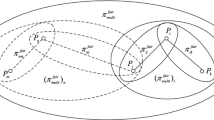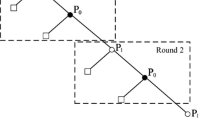Abstract
Rational secure two-party computation is one of the important researches in cryptography. Since the purpose of rational parties is to maximize their own utilities, the parties prefer to use a mixed strategy, which will cause a change in entropy. Some protocols solved the problems of fairness and security by using entropy function and utility function respectively. However, the cost of ensuring protocol security by setting a really high utility function is often higher than the value of the protocol itself, and the protocol is only suitable for a single privacy requirement. In this paper, we propose a secure two-party computation protocol based on entropic criterion and set the corresponding security entropic threshold according to different privacy requirements. Secure entropy is used as a method to evaluate the security of two parties in different scenes. Furthermore, we explore the relationship between secure entropy and utility function, then to select the optimal utility function within the range of secure entropic threshold. The model we proposed is more flexible and universal. Furthermore, the security state of the model is well predicted.


Similar content being viewed by others
References
Asharov G, Canetti R, Hazay C (2011) Towards a game theoretic view of secure computation. Advances in cryptology eurocrypt 2011. Springer, New York, pp 426–445
Chen X, Li J, Ma J et al (2012) New algorithms for secure outsourcing of modular exponentiations. IEEE Trans Parallel Distrib Syst 25(9):2386–2396
Garay J, Katz J, Maurer U, Tackmann B, Zikas V (2013) Rational protocol design: cryptography against incentive-driven adversaries. In: 2013 IEEE 54th annual symposium on foundations of computer science (FOCS). IEEE, pp 648–657
Glicksberg LA (1952) Further generalization of the Kakutani fixed point theorem, with application to nash equilibrium points. Proc Am Math Soc 3(1):170–174
Gordon SD, Katz J (2006) Rational secret sharing, revisited. Security and cryptography for networks. Springer, New York, pp 229–241
Goldreich O, Micali S, Wigderson A (1987) How to play any mental game. In: Proceedings of the 19th Symposium on the Theory of Computing (STOC), pp 218–229
Halpern J, Teague V (2004) Rational secret sharing and multiparty computation. Of the thirty—sixth annual ACM symposium on theory of computing. ACM, New York, pp 623–632
Harsanyi JC (1973) Games with randomly disturbed payoffs: a new rationale for mixed-strategy equilibrium points. Int J Game Theory 2(1):1–23
Hazay C, Lindell Y (2010) Efficient secure two-party protocols: techniques and constructions. Springer, New York
Maleka S, Shareef A, Rangan CP (2008a) The deterministic protocol for rational secret sharing. IEEE international symposium on parallel and distributed processing, IPDPS 2008, pp 1–7
Maleka S, Shareef A, Rangan CP (2008b) Rational secret sharing with repeated games. Information security practice and experience. Springer, New York, pp 334–346
Myerson RB (1997) Game theory: analysis of conflict. Harvard University Press, Cambridge
Nojoumian M, Stinson DR (2012) Socio-Rational secret sharing as a new direction in rational cryptography. In: Grossklags J, Walrand J (eds) Decision and Game Theory for Security. GameSec 2012. Lecture Notes in Computer Science, vol 7638. Springer, Berlin, Heidelberg, pp 18–37
Shannon CE (1948) A mathematical theory of communication. Bell Syst Tech J 27(4):379–423
Stefan R, Sandra K (2018) Password security as a game of entropies. Entropy 20(5):312
Wang Y, Chen L et al (2015) Fairness in secure computing protocols based on incentives. Soft Comput 20(10):3947–3955
Wang Y, Zhang S, Tang Y et al (2018) Rational adversary with flexible utility in secure two-party computation. J Ambient Intell Human Comput:1–15. https://doi.org/10.1007/s12652-017-0669-z
Wang Y et al (2019) Secure computation protocols under asymmetric scenarios in enterprise information system. Enterprise Information Systems:1–21
Yao AC (1982) Protocols for secure computation. In: Foundations of Computer Science. SFCS'08. 23rd Annual Symposium on IEEE, pp 160–164
Yang Y, Peng H et al (2017) General theory of security and a studycase in internet of things. IEEE Internet Things J 4(2):592–600
Yang Y, Niu X et al (2018) General theory of security and a study of hacker’s behavior in big data era. Peer to Peer Netw Appl 2(1):210–219
Yimin H, Xingli C et al (2018) The complexity and entropy analysis for service game model based on different expectations and optimal pricing. Entropy 20(11):858
Zhang W (1996) Game theory and information economics. People’s Publishers, Shanghai
Zhang L, Wang Y, Li F et al (2019) A game-theoretic method based on Q-learning to invalidate criminal smart contracts. Inf Sci 498:144–153
Funding
Funding was provided by National Natural Science Foundation of China (Grant No. 61962009), Major Scientific and Technological Special Project of Guizhou Province (Grant No. 20183001), Open Funding of Guizhou Provincial Key Laboratory of Public Big Data (Grant No. 2018BDKFJJ009).
Author information
Authors and Affiliations
Corresponding author
Additional information
Publisher's Note
Springer Nature remains neutral with regard to jurisdictional claims in published maps and institutional affiliations.
Rights and permissions
About this article
Cite this article
Zhang, X., Liu, Y. & Chen, Y. A new entropic criterion model in rational secure two-party computation. J Ambient Intell Human Comput 13, 1363–1372 (2022). https://doi.org/10.1007/s12652-020-02633-4
Received:
Accepted:
Published:
Issue Date:
DOI: https://doi.org/10.1007/s12652-020-02633-4




